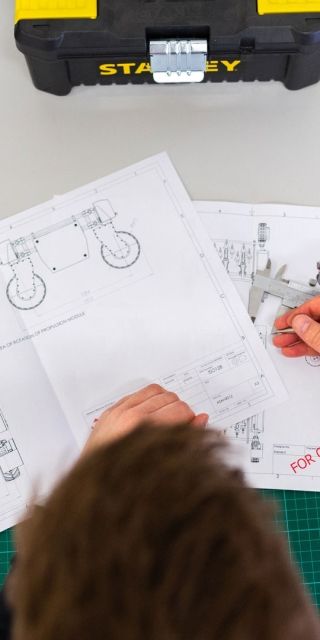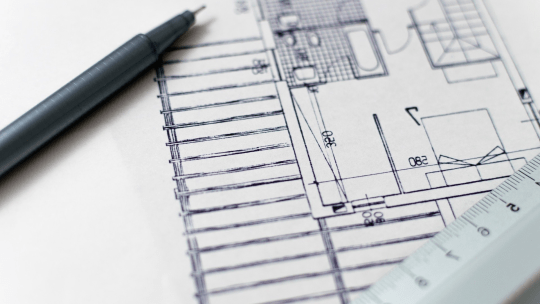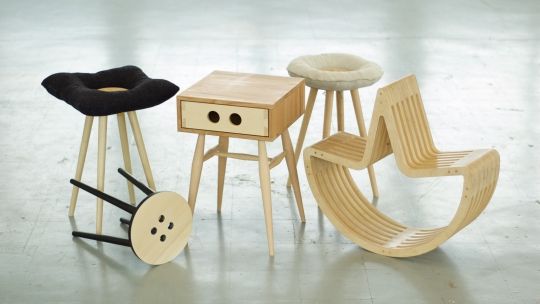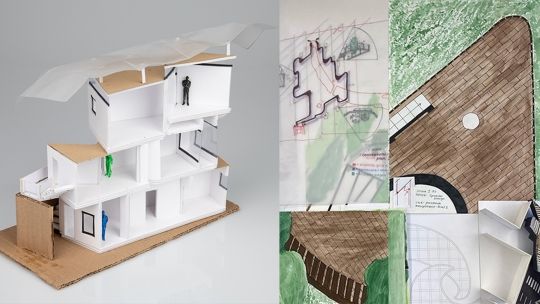
BEng (Hons) Engineering Design with Mechanical Engineering
- Study Mode: Part Time
- Location: Aylesbury
- Duration: Four Years
- Start Date: September 2024
This programme will give you the skills and knowledge you’ll need to delve deeply into a range of engineering and mechanical topics, where you’ll find innovative solutions to an array of problems. Mathematics, particularly calculus, differential equations, and linear algebra are at the heart of this course. You will also explore engineering science, technology, statics, and dynamics.
With this dynamic combination, you'll master the art of turning concepts into real-world solutions in industries like transportation, energy, and manufacturing. Join us to shape a sustainable, innovative, and exciting future through the power of mechanical engineering and design.
* Please note this course is Subject to Validation.
Why study this subject?
Are you passionate about bringing your creative ideas to life while making a tangible impact on the world? Studying engineering design with mechanical engineering is your gateway to a future where you'll learn to innovate, design, and build advanced machines and systems that power our modern world.
Why study at Buckinghamshire New University?
With a rich tradition of delivering exemplary craft and design education for over 130 years, coupled with more than 25 years of expertise in offering engineering degrees, Buckinghamshire New University stands as the ideal starting point for your creative career.
Our committed teaching team, brimming with industry experience, is your gateway to invaluable insider insights and a vast professional network. Industry practitioners and successful alumni also actively participate in your education by delivering guest lectures, conducting masterclasses and workshops, arranging site visits, and even contributing to the assessment of your work.
During your time here, you'll gain hands-on practical skills that will set you apart in the eyes of potential employers. Our state-of-the-art CAD/CAM labs grant you access to industry-standard equipment, ensuring that you graduate fully equipped for your first job.
Delivered through lectures, tutorials, and studio-based work, each of the modules you study will help to build your identity and specialist knowledge as an Engineering Designer. You will also work closely with other students across a range of disciplines allowing you to experience the professional structures you will be a part of in the workplace.
Located just a short train ride away from London, you'll have the opportunity to explore galleries, museums, construction project sites, and places of historical and contemporary significance. This not only broadens your horizons but also introduces you to potential clients, contacts, and future project sites.
Opportunity modules are a key part of the BNU curriculum. You’ll choose modules in your first year from a broad selection in areas such as sustainability, entrepreneurship, creativity, digital skills, personal growth, civic engagement, health & wellbeing and employment. Opportunity modules are designed to enable you to develop outside the traditional boundaries of your discipline and help you to further stand out from the crowd to future employers.
Learning while you work goes hand in hand and gives you a clear journey within your life’s career. Targets that are realistic, achievable and worth striving for. Finishing this degree has given me a massive self-confidence boost and put me in a better place.Simon Wheeler

What facilities can I use?
We have a range of state-of-the-art-facilities for you to get hands-on with, here you’ll have access to Digital technologies and industry standard software including ECAD and MCAD software, MATLAB Simulink and SolidWorks.
You’ll develop essential skills within our Engineering IT Studio, using programmes such as AutoCAD, 3d Studio Max, Rhino and Photoshop through structured lessons in IT/CAD/CAM suites and studios. You’ll also get hands-on with 3D printing and augmented reality (AR) technology.
As well as this you’ll also will also have access to Digital technologies and industry standard software including ECAD and MCAD software, MATLAB Simulink and SolidWorks.
What will I study?
On the Mechanical Engineering specialism, you’ll explore a variety of topics in depth, including mathematics, engineering science, technology and statics and dynamics.
Our programme will equip you with the skills to navigate critical aspects essential for your professional development in the field. These include mastering topics like the strength of materials, solid mechanics, materials engineering, thermodynamics, lean manufacturing principles, and computer-aided design/computer-aided manufacturing (CAD/CAM).
You’ll also have the opportunity to take part in industry-based projects, trips to project sites and workshops.
How will I be taught and assessed?
Throughout the course, a diverse array of active teaching methods and authentic assessment strategies will be employed, with an emphasis on both practical and traditional teaching approaches. Laboratory sessions and various hands-on activities will serve to reinforce the knowledge gained from lectures and tutorials.
Traditional forms of assessment include:
- Written assignments
- Report
- Portfolio and digital models
- In-class assignments
- Computer-based test
- Set Presentations (for example, poster and oral)
- Proposal
- Dissertation
Within your close-knit tutor group, everyone’s input is recognised and valued. Not only will you make friends for life, but you’ll also make important connections that will last through your career, and you’ll form a network, just like you’d find in the working-world.
Stories and news within the School of Engineering and the Built Environment

George's story
Engineering graduate, George Kingston-Rayes, recently shared with us the lessons he learnt at BNU, and how they’ve helped him thrive in the industry.

Why choose a career in Engineering?
Engineering is one of the fastest growing and broadest sectors within the UK, meaning it is crucial to our economy and critical that employers find graduates who are ready to step into hands-on and innovative roles.
What are the course entry requirements?
A typical offer will require a UCAS tariff score of: 100 - 128
UCAS points can be obtained through qualifications such as A levels, T levels, BTEC or an Access to Higher Education course in a relevant subject. Please list all your qualifications on the application form as you will be asked to provide copies when we receive your application.
Five GCSEs at grade C/4 or above, including Maths, English and a Science, Technology or Engineering-related subject. A-levels at grade C or above in both a Mathematical based subject and a Science, Technology, Engineering or additional Mathematics related subject, or 90+ credits in an Engineering BTEC at level 3. T levels should be in Engineering or Construction.
Students from a HNC/HND and Foundation Degree Engineering may have the opportunity to join this programme as part of the progression route at Level 5 or Level 6.
Applications are also welcomed from mature students who have gained relevant skills through a wide range of vocational qualifications or responsible experience and experiential learning will also usually be considered.
Applicants need to be working in the engineering or related field in order to join the course.
Modules
This provides a guide of the modules that make up your course. You can find more information about how your course is structured on our Academic Advice section.
This course has Opportunity modules.
Opportunity modules are a key part of the BNU curriculum. You’ll choose modules in your first year from a broad selection in areas such as sustainability, entrepreneurship, creativity, digital skills, personal growth, civic engagement, health & wellbeing and employment. Opportunity modules are designed to enable you to develop outside the traditional boundaries of your discipline and help you to further stand out from the crowd to future employers. Find out more.
You must choose 2 x 10 credit Level 4 Opportunity modules from the Opportunity module catalogue.
What are the tuition fees
Home
-
Home, Academic Year 2024 - 2025: £6,935 per year
What are my career prospects?
Throughout your time with us we’ll support you on the route to your chosen career. We’ll help you to develop crucial skills, encouraging you to become enterprising, employable and good leaders. We also help you find employment after graduation. Have a look at our Careers and Employability pages to find out more.
Upon graduation, you will be prepared for a range of career possibilities. Using the skills and knowledge learnt on this course, you could find yourself working in industries such as:
- engineering services
- scientific and research industries
- automotive industries design
- manufacturing
- oil and gas industry
- aerospace
- energy
- medicine
- and sport sectors.
You may also choose to stay on at Buckinghamshire New University and study our MSc Engineering Design or another postgraduate programme.
Course leader









